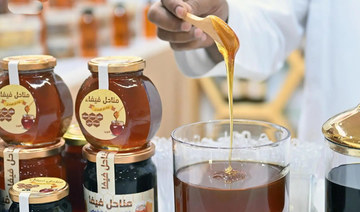RIYADH: Saudi Arabia’s capital is experiencing what is best described as a “gastronomic explosion.”
International brands have entered the market alongside proliferating homegrown Saudi restaurants and street food, contributing to the growing cultural diversity of Riyadh.
Until recently, Riyadh’s culinary scene was dominated by a few local restaurants offering predominantly Saudi and traditional Najdi cuisine, which hails from the historical region encompassing modern-day Riyadh, Qassim and Hail. This included warm and hearty stews, rich meat dishes, and savory regional specialties that have been a staple in traditional restaurants for decades.
The transformation began with the Saudi Vision 2030 economic and social plan in 2016, which has gained significant momentum since 2021 as the pandemic has waned. Riyadh has seen a surge in international chefs and eateries, accompanied by an increasing influx of tourists and expatriates.
Today, Saudi Arabia boasts a range of restaurants from around the world, catering to diverse tastes and budgets, both in fine dining and street food.
Simultaneously, Riyadh, transitioning from being solely an administrative hub to a vibrant cosmopolitan metropolis, attracts talent from across the globe. This includes restaurants and chefs eager to tap into what could potentially become the Middle East’s largest culinary market.
Vision 2030 aims to boost household spending on cultural and entertainment activities to 6 percent, a significant increase from the initial 2.9 percent when the plan was unveiled in 2016.
Among the latest international arrivals are Spago Riyadh, from the renowned celebrity chef Wolfgang Puck, Flamingo Room by Tashas, a concept store and eatery from the celebrated South African chef, and Mr. Chow, the Chinese restaurant specializing in authentic Beijing cuisine, founded by British-Chinese restaurateur Michael Chow, set to open in early October.
Other newcomers include Ferdi Restaurant, famous for its Parisian burgers, and LPM Restaurant & Cafe, offering cuisine from the Cote d’Azur, among others.
Cool Inc, a Saudi lifestyle curator, is behind the launch of Ferdi, Spago, and Cut by Wolfgang Puck, with plans announced in late 2022 for openings such as Scott’s, Sexy Fish, Wagyumafia, Gymkhana, and Madeo.
Natasha Sideris, CEO and founder of Tashas Group, expressed her enthusiasm for the evolving culinary scene in Riyadh, noting the city’s transition from a limited dining market to a flourishing landscape with international brands and innovative local concepts.
Riyadh’s newest addition, Flamingo Room by Tashas, is located in the vibrant Diriyah neighborhood, offering a multi-faceted experience that includes Tashas restaurant, Collective Africa (a retail concept store), the African Lounge, and The Stargaze Garden (a rooftop dining space).
In June of this year, Riyadh introduced Via Mercato, a luxury culinary destination housed in the upscale dining complex, Via Riyadh. It features artisanal and specialty foods from around the world, drawing attention on social media with the appearance of actress Sofia Vergara amid its sleek, architecturally striking design.
Matthew Lawson, general manager for Via Mercato, attributed Riyadh’s emergence as a culinary capital to at least three factors: a surge in tourism; heavy investments in the hospitality and food industries; and an increasingly cosmopolitan and sophisticated local population seeking diverse culinary experiences.
Via Mercato’s luxury market offers a wide range of artisanal and specialty food products, including baked goods, cheeses and Japanese delicacies. Additionally, it features a caviar bar, pizzeria, rotisserie and a cheese shop, all with personalized service and expert guidance from knowledgeable staff.
For those seeking more casual and adventurous fare, Riyadh boasts a growing choice of street cuisine, including both local Saudi dishes and international flavors. Despite the city’s reputation for a car-centric lifestyle, there are vibrant outdoor areas where residents and visitors alike explore new culinary experiences.
Options include Thai Soi, Barbar Riyadh (a Lebanese street food restaurant), and various eateries serving local Saudi and Arabic specialties such as baleela, koshari and manto.
Each month sees the opening of several high-end global restaurants and street food joints in Riyadh, underlining the city’s increasing appeal to food enthusiasts locally, regionally and internationally.
As the culinary landscape expands, there is a growing interest among Riyadh residents in making the most of the “gastronomic explosion.”
The establishment of the Culinary Arts Commission under the Saudi Ministry of Culture reflects this trend. The mission of the body includes rating restaurants, dishes and chefs, establishing culinary arts regulations, and promoting both Saudi and international culinary traditions. It also aims to document recipes and share them to introduce Saudi cuisine globally.
Matthew Lawson emphasized the importance of facilitating culinary exchanges and collaborations with chefs and institutions worldwide, highlighting the potential to bring global expertise and exposure to the Kingdom. This local and international exchange is a pivotal factor in Riyadh’s ascent as an international culinary destination.











































